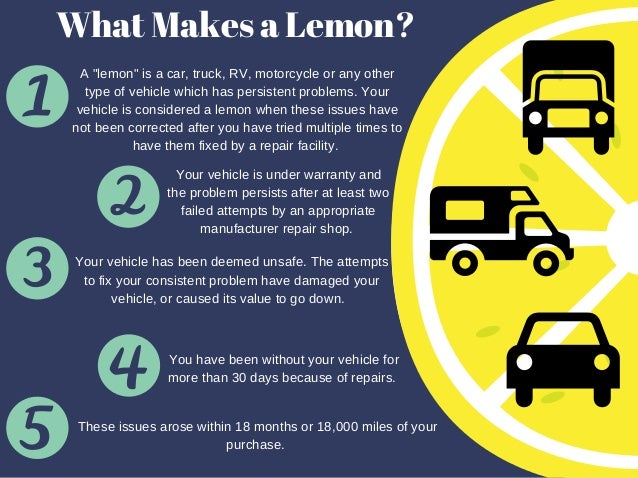

Just what is considered a substantial defect varies in each state.īefore being required to replace the auto, or provide a full refund, the manufacturer or dealer must be allowed a certain number of attempts at repairing the defect, free of charge to the consumer. Substantial defects are those which make the car inoperative or unsafe. A substantial defect is not a minor issue, like a broken knob, faulty radio, or anything that can be fixed with a simple repair. What is a Substantial DefectĪ substantial defect is a flaw or problem that impairs the vehicle’s normal use, safety, or value. A car qualifies as a lemon under the law only if it exhibits a problem considered to be a substantial defect. While consumers may find themselves stuck with just about any product that is defective, and considered in their minds to be lemons, in most states, actual lemon laws apply to new car purchases. If the defect cannot be repaired within four attempts, two attempts for a safety defect, or if the vehicle is out of service for 30 days within the first 12,000 to 18,000 miles, or 12 to 24 months of ownership, the manufacturer must replace the new vehicle, or provide a full refund of the purchase price, including any additional fees, taxes and other charges. Nearly all state lemon laws require manufacturers to repair any substantial defect at their own cost. Most states now have lemon laws that define what qualifies as a “lemon,” and what remedies are available to consumers. While the federal government has provided laws guiding the interaction between manufacturers and buyers, and required disclosure of warranty provisions, it is left to each state to decide whether to further protect consumers from poorly made products. The Federal Trade Commission provides information related to manufacturer warranties on their website. This gives consumers information on both the issues that are covered under warranty, as well as a look at what they can expect to happen if something goes wrong – before they buy.

The federal government began taking action to protect consumers by enacting the Magnuson-Moss Warranty Act of 1975, which requires manufacturers and sellers to provide cons umers with detailed warranty information on their products. This often leaves the decision up to a court, if the manufacturer or seller refuses to comply. The UCC does not, however, specify what constitutes a lemon.

A provision of the UCC gives consumers the right to receive a replacement item, or a full refund, for a lemon item.

The UCC is not legislation, but a product of the American Law Institution, and the National Conference of Commissioners on Uniform State Laws.
LEMON LAW CODE
The movement in government action to protect consumers from lemon purchases continued, with additional federal legislation, and state legislation specifically referred to as “lemon laws.” The Uniform Commercial Codeįirst published in 1959, the Uniform Commercial Code (“UCC”) attempts to provide continuity in sales and other commercial transactions in all states. What are now known as lemon laws had their beginnings when Congress took action requiring manufacturers to provide written, detailed warranty information with the products they sell. Government Action to Protect Consumers From Lemon Purchases Unfortunately, consumers who happened to receive a brand new car with serious defects were out in the cold when it came to forcing the manufacturer to make expensive repairs, or replace the car. When purchasing a brand new car, consumers expect to leave behind the mechanical issues of their old car, and not take on the mechanical issues of a used car. In an era when consumers purchase an average of 307,000 motor vehicles every week in the U.S., the potential for taking advantage of those consumers is huge.


 0 kommentar(er)
0 kommentar(er)
